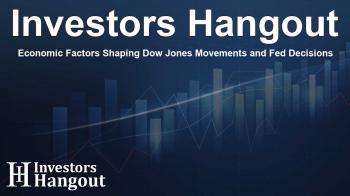Economic Factors Shaping Dow Jones Movements and Fed Decisions

Analyzing Dow Jones Performance Amid Economic Changes
The Dow Jones Industrial Average (US30USD) showcased a modest increase of approximately 0.29% recently, trading around $44,471. This rise indicates a level of support emerging from a challenging week prior.
Key Insights from Recent Market Trends
After facing some hurdles last week, the Dow has been experiencing a phase of consolidation. Investors are focused on the upcoming CPI report, as the repercussions of trade tariffs on inflation are still unraveling.
Trade tariffs have become a significant challenge for U.S. equities, influencing the financial landscape. With tariffs being a pressing concern, the Dow has proven to be particularly sensitive to any related news, especially contrasting with tech-focused indices.
The pivotal question revolves around the commitments to negotiate tariff agreements, particularly the stance of the current administration. The effectiveness of trade negotiations may hinge on whether other nations perceive this as a final opportunity for a settlement.
As discussions with the EU and Mexico unfold, new tariffs are looming if favorable agreements are not established soon. Observing the market's tension marked by the 'Liberation Day' sell-off, impactful decisions are necessary for maintaining stock market stability.
The prevailing uncertainty regarding tariffs continues to exude pressure on inflation forecasts and monetary policies dictated by the Federal Reserve. Increased market volatility poses challenges, reducing the risk appetite among investors, which could reflect negatively on U.S. equities.
Anticipating the CPI Report and Fed Interest Rate Decision
With recent indications from policymakers regarding potential rate cuts, the upcoming CPI release carries considerable weight. A decreasing inflation trend could mitigate the pressures the Federal Reserve faces regarding interest rates.
The CPI data will serve as a crucial indicator for assessing inflationary trends, particularly in light of recent tariff impacts. If inflation remains in check, it would support arguments against immediate rate hikes.
This scenario is especially critical as the upcoming PCE report is set for later this month, making the CPI report the last crucial piece of information prior to the July 30th Fed decision.
Upcoming Economic Indicators to Watch
As we approach the significant consumer price index releases, investors should be on alert for potential market shifts:
- 08:30 EDT: U.S. Consumer Price Index June (MoM)
- 08:30 EDT: U.S. Consumer Price Index June (YoY)
- 08:30 EDT: U.S. Core CPI June (s.a.)
- 08:30 EDT: U.S. CPI n.s.a. June (MoM)
- 08:30 EDT: CPI ex. Food & Energy June (MoM)
- 08:30 EDT: CPI ex. Food & Energy June (YoY)
- 08:30 EDT: New York Empire State Manufacturing Index (July)
- 08:55 EDT: Redbook Index (YoY)
- 09:15 EDT: Fed’s Bowman speech
- 12:15 EDT: Fed’s Barr speech
- 14:45 EDT: Fed’s Collins speech
- 16:30 EDT: API Weekly Crude Oil Stock
- 19:45 EDT: Fed’s Logan speech
The outcomes of these announcements are set to influence the Dow's trajectory and overall investor sentiment as they provide insights into both inflation metrics and broader economic conditions.
Frequently Asked Questions
What impact do tariffs have on the Dow Jones?
Tariffs can lead to increased costs for manufacturers and consumers, impacting inflation rates and the overall performance of the Dow Jones Industrial Average.
How does the CPI report affect Federal Reserve decisions?
The CPI report helps the Fed gauge inflation trends, influencing their monetary policy decisions on interest rates.
Why is market uncertainty important for investors?
Market uncertainty can affect investor confidence and risk appetite, which may result in lower equity prices.
What is the significance of the upcoming PCE report?
The PCE report is essential as it provides additional insights into consumer inflation trends, complementing the CPI data.
How does the performance of the Dow compare to tech indices?
Historically, the Dow tends to react more sensitively to macroeconomic factors like tariffs compared to tech-focused indices, which may exhibit different volatility patterns.
About The Author
Contact Owen Jenkins privately here. Or send an email with ATTN: Owen Jenkins as the subject to contact@investorshangout.com.
About Investors Hangout
Investors Hangout is a leading online stock forum for financial discussion and learning, offering a wide range of free tools and resources. It draws in traders of all levels, who exchange market knowledge, investigate trading tactics, and keep an eye on industry developments in real time. Featuring financial articles, stock message boards, quotes, charts, company profiles, and live news updates. Through cooperative learning and a wealth of informational resources, it helps users from novices creating their first portfolios to experts honing their techniques. Join Investors Hangout today: https://investorshangout.com/
The content of this article is based on factual, publicly available information and does not represent legal, financial, or investment advice. Investors Hangout does not offer financial advice, and the author is not a licensed financial advisor. Consult a qualified advisor before making any financial or investment decisions based on this article. This article should not be considered advice to purchase, sell, or hold any securities or other investments. If any of the material provided here is inaccurate, please contact us for corrections.

